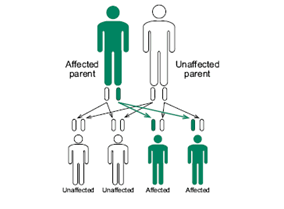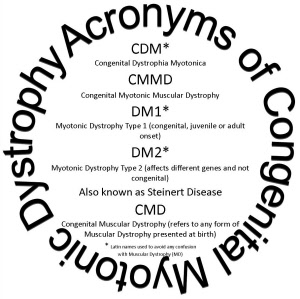 |
|
50% chance of inheritance from an affected parent.
|
Myotonic Dystrophy can be congenital (symptoms at birth) Childhood (pre pubescent/post pubescent with symptoms beginning before the age of 18) Adult onset (symptoms from 18-40) or Late onset (40 or older when symptoms start)
It is a genetic condition which presents itself at any age. It is a multi-systemic Neuromuscular disorder, under the umbrella of 'Muscular Dystrophy'. The presence of 'anticipation' means that the condition worsens with every generation.
Myotonic Dystrophy is hereditary, and if a child is born with CDM, one of the parents WILL have it. This is quite a daunting realisation, and if there is no prior knowledge of the disorder in the family, it can be a scary thing to come to terms with.
CONGENITAL MEANS 'AT BIRTH'
This is very important, as the diagnosis of Congenital DM is given if symptoms are apparent from birth. There are other variants of DM (Childhood onset, Adult onset,) however, Congenital DM is the most severe form and comes with a unique set of symptoms and challenges..
DM2 is Myotonic Dystrophy type 2, which shares some of the symptoms of DM1, but is caused by a different gene mutation. DM2 is usually adult onset, with some reporting of childhood onset. DM2 does NOT have a congenital form.
MYOTONIC MEANS CONTRACTION OF MUSCLES.
Myotonia often presents itself in the hands and is an inability to release grip due to the contraction of the muscles. (with Congenital this is often one of the later symptoms). It also appears in the tongue, jaw and internal muscles often causing pain.
DYSTROPHY REFERS TO THE WASTAGE OF MUSCLES.
There are many different effects of this disorder, no two people will present in the same way. Despite being the most common form of Adult Onset Muscular Dystrophy, it is still classed as rare. New information is being discovered all the time. Myotonic Dystrophy is actually twice as common as Huntingtons (an interesting statistic for you)
CDM is USUALLY inherited from the Mother, however, on rare occasions, it can be passed down Paternally. This is relatively new information, as previously it was believed only inherited Maternally. Information from the French DM Registry (presented at the IDMC 2017) is that there is 13% chance of congenital myotonic dystrophy being passed down from the father. Much higher than the 1% previously quoted in literature.
Childhood and Adult onset DM1, and DM2 can be inherited equally from both parents.
A child with CDM is often, but not always, diagnosed at birth or fairly soon after. They will likely have spent some time in Neo-natal Intensive care, with help with breathing and feeding.
Once discharged/diagnosed, your child is likely to have many appointments with different specialists. Such as:
Speech and Language, Occupational Therapy, Physical Therapy, Ophthalmology, Sleep Clinic, Cardiology, and most importantly, a specialist Neurologist.
All of these appointments may seem daunting, but they are important. We are here to provide support, so please do not hesitate to contact us.
We would strongly recommend reaching out to your local Neuromuscular Care Advisor. You can see a list of them on the MDUK website HERE. If you would like any help with making this connection please do contact us and we will be happy to help. Having a Care Advisor really does help take some of the stress away from families, as they can help co-ordinate and support.


Disclaimer:
"This site is owned and operated by CureDM, which is a registered charity. Nothing contained in this site is or should be considered, or used as a substitute for medical advice, diagnosis or treatment. The site owners and administrators cannot accept any legal or personal liability for the outcomes of actions taken by you in using this information. This site and its information do not constitute the practice of any medical, nursing, registered dietitian or nutritionist, or other professional health care advice, diagnosis or treatment.
All items and articles are written by individual authors. The opinions expressed are entirely the authors' own, except where clearly indicated. We strongly advise you to speak with a medical professional about all aspects of the condition."